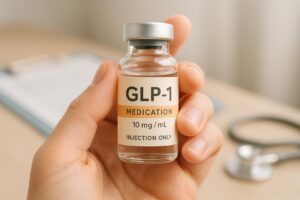Why Do GLP-1 Medications Cause Fatigue?

The experience of fatigue can often feel like an insurmountable hurdle, especially when embarking on a weight loss journey. For those utilizing GLP-1 (glucagon-like peptide-1) receptor agonists, such as Semaglutide and Tirzepatide, fatigue is frequently reported, particularly during the initial stages of treatment. Understanding why this fatigue occurs is essential for anyone considering or currently using these medications. Today, we will dive into the multifaceted reasons behind this phenomenon, the implications for your health journey, and practical strategies to manage it effectively.
Introduction
Did you know that nearly half of Americans list weight loss as a primary health goal? With the rise in obesity and related health issues, medications like GLP-1 receptor agonists have become a vital part of weight management strategies. But along with their benefits, many users report feeling more fatigued after starting these treatments. This raises an important question: why do GLP-1 medications cause fatigue?
In this blog post, we will explore the intricate relationships between GLP-1 medications, weight loss, and fatigue. We will discuss the biological mechanisms at play and provide actionable insights on how to address and manage this side effect effectively. By the end of this post, our aim is to empower you with knowledge about GLP-1 medications, helping you navigate your weight loss journey with confidence and clarity.
We will cover several key aspects, including the following:
- The science of GLP-1 and its role in weight management
- The mechanisms behind fatigue in GLP-1 usage
- Strategies to manage fatigue while on GLP-1 medications
- The importance of a holistic approach to weight loss
By understanding these components, we can recognize that while fatigue might be a common side effect of GLP-1 medications, it doesn’t have to derail your weight loss goals. Instead, we can view it as an opportunity to foster a healthier relationship with our bodies.
The Science of GLP-1 and Weight Management
GLP-1 is a hormone that plays a crucial role in regulating appetite and blood sugar levels. Originally discovered in the early 1980s, it has gained recognition as a key player in the management of type 2 diabetes and obesity. GLP-1 receptor agonists work by mimicking this hormone, which leads to reduced appetite and increased feelings of fullness. This can facilitate significant weight loss, making these medications an attractive option for those struggling with obesity.
Mechanism of Action
When we consume food, GLP-1 is released from the intestines. It helps to:
- Enhance Insulin Secretion: GLP-1 promotes the secretion of insulin from the pancreas in response to food intake, which helps to lower blood sugar levels.
- Suppress Glucagon Release: It inhibits glucagon release, a hormone that raises blood glucose, thereby contributing to better blood sugar control.
- Slow Gastric Emptying: By slowing the rate at which food leaves the stomach, GLP-1 medications enhance satiety and reduce hunger.
The combination of these effects can lead to improved glycemic control and weight loss. However, as we will explore, these physiological changes can also result in fatigue, especially during the body’s adjustment period.
Historical Context
Historically, weight loss solutions have been fraught with challenges and side effects. GLP-1 receptor agonists have emerged as a scientifically validated option, offering promising results for many individuals. Yet, as we embrace these innovations, it is crucial to consider their implications on overall well-being, including the potential for fatigue.
Mechanisms Behind Fatigue in GLP-1 Usage
Now that we understand the role of GLP-1 medications in weight management, let’s delve into why they can lead to feelings of fatigue. There are several key mechanisms at play, which we will explore in detail.
1. Caloric Deficit and Nutritional Needs
One of the primary reasons individuals experience fatigue while on GLP-1 medications is related to the caloric deficit created by appetite suppression. When appetite is reduced, many people may unconsciously consume fewer calories than their bodies require. This caloric deficit can lead to:
- Decreased Energy Levels: Insufficient caloric intake can result in lower energy levels, making individuals feel more fatigued.
- Nutritional Deficiencies: A focus on smaller meals may lead to inadequate intake of essential nutrients, which can further exacerbate feelings of fatigue.
2. Blood Sugar Fluctuations
GLP-1 medications are known to lower blood sugar levels. While this is beneficial for weight management and diabetes control, it can also lead to:
- Hypoglycemia: In some cases, especially if meals are skipped or not balanced properly, blood sugar levels can drop too low, resulting in symptoms such as tiredness, dizziness, and weakness.
- Fatigue from Adjustment: As the body adapts to lower blood sugar levels, it may take time for energy levels to stabilize, leading to temporary fatigue.
3. Hormonal Changes
The process of weight loss can trigger various hormonal changes in the body. These changes can affect energy levels and overall mood. For instance:
- Leptin and Ghrelin: Weight loss affects the balance of these hormones, which regulate hunger and satiety. Alterations in their levels can impact energy and motivation.
- Cortisol: Stress related to significant weight loss may increase cortisol levels, which can lead to feelings of fatigue and exhaustion.
4. Psychological Factors
The psychological aspects of weight loss should not be overlooked. As individuals navigate their weight loss journey, they may experience:
- Stress and Anxiety: The pressure to achieve desired weight loss goals can lead to increased stress and anxiety, which can contribute to fatigue.
- Emotional Adjustment: Changes in body composition and self-perception can also impact mental energy and motivation.
Summary of Mechanisms
In summary, fatigue experienced by individuals using GLP-1 medications can stem from a combination of caloric deficits, blood sugar fluctuations, hormonal changes, and psychological factors. Understanding these mechanisms is the first step in addressing and managing fatigue effectively.
Strategies to Manage Fatigue While on GLP-1 Medications
While fatigue can be a common side effect of GLP-1 medications, there are several strategies we can adopt to minimize its impact and enhance our overall well-being.
1. Optimize Nutritional Intake
Ensuring that we meet our nutritional needs is crucial for combating fatigue. Here are some tips to consider:
- Frequent, Balanced Meals: Instead of relying on fewer meals, aim for smaller, balanced meals throughout the day. Incorporate a mix of protein, healthy fats, and complex carbohydrates to maintain energy levels.
- Focus on Nutrient-Dense Foods: Incorporate foods rich in vitamins and minerals to meet your body’s needs. Foods like leafy greens, lean proteins, nuts, and whole grains can help provide sustained energy.
- Stay Hydrated: Dehydration can contribute to feelings of fatigue. Ensure you are drinking enough water throughout the day, and consider adding electrolytes if necessary.
2. Monitor Blood Sugar Levels
Keeping track of blood sugar levels can help manage fatigue effectively. Here are some strategies:
- Regular Monitoring: If you have diabetes or are concerned about blood sugar levels, regular monitoring can help you understand how your body responds to GLP-1 medications.
- Balanced Snacks: Carry healthy snacks, such as nuts or protein bars, to help maintain steady blood sugar levels throughout the day.
3. Gradual Dose Adjustments
If fatigue persists, consider discussing your medication dosage with your healthcare provider. A gradual increase in dosage can help your body adjust more comfortably, potentially reducing fatigue.
4. Focus on Mental Well-Being
Mental health plays a significant role in overall energy levels. Here are some ways to promote psychological wellness:
- Stress Management Techniques: Incorporate practices such as mindfulness, yoga, or meditation to help manage stress levels.
- Seek Support: Engaging in support groups or seeking counseling can provide emotional support during your weight loss journey.
5. Exercise Wisely
While exercise can boost energy levels, it’s essential to find a balance that works for you:
- Start Slow: If you are new to exercise, begin with low-impact activities such as walking or swimming, gradually increasing intensity as you feel more comfortable.
- Incorporate Resistance Training: Strength training can help preserve muscle mass, which is especially important during weight loss.
Summary of Management Strategies
By optimizing nutritional intake, monitoring blood sugar levels, adjusting medication dosages, focusing on mental well-being, and exercising wisely, we can effectively manage fatigue while on GLP-1 medications. These approaches not only help mitigate fatigue but also promote a healthier overall lifestyle.
The Importance of a Holistic Approach to Weight Loss
While GLP-1 medications can be an effective tool in managing weight, it’s essential to adopt a holistic approach to weight loss. This means considering all aspects of health, including physical, emotional, and psychological well-being.
1. Personalization is Key
At TrimRx, we believe that personalized weight loss solutions are crucial for achieving sustainable results. Our medically supervised programs are designed to meet each individual’s unique needs, ensuring that everyone receives the support they require throughout their journey.
2. Emphasize Long-Term Lifestyle Changes
Weight loss should not be viewed as a temporary fix but rather a journey toward a healthier lifestyle. Incorporating long-term changes in diet, exercise, and mental health practices can lead to lasting results without the struggle of constant fatigue.
3. Stay Informed and Engaged
Education is empowering. Staying informed about your health, the medications you are taking, and their potential side effects can help you make better health decisions. Engaging with healthcare providers and seeking guidance can enhance your understanding of how to navigate your weight loss journey effectively.
Summary of Holistic Approach
Taking a holistic approach to weight loss involves personalizing solutions, emphasizing long-term lifestyle changes, and staying informed about health practices. This comprehensive strategy not only addresses fatigue but also fosters a healthier relationship with food and body image.
Conclusion
Fatigue can be a challenging side effect of GLP-1 medications, but understanding its causes allows us to implement effective management strategies. By optimizing our nutritional intake, monitoring blood sugar levels, and focusing on mental well-being, we can mitigate fatigue and maintain our energy levels.
At TrimRx, our commitment to personalized care ensures that we are equipped to support you every step of the way in your weight loss journey. Together, we can navigate the complexities of GLP-1 medications and embrace healthier lifestyles that are sustainable and fulfilling.
FAQ
How long does fatigue last when starting GLP-1 medications?
Fatigue is often most pronounced during the initial adjustment period, which can last a few weeks. Many individuals report that energy levels stabilize as their bodies adapt to the medication.
Can I continue exercising while experiencing fatigue from GLP-1s?
Yes, it is possible to engage in exercise while feeling fatigued. Aim for low-impact activities and listen to your body, adjusting the intensity as needed.
Should I alter my diet when taking GLP-1 medications?
Yes, focusing on balanced, nutrient-dense meals and maintaining hydration is essential for managing fatigue and supporting overall health.
Is it normal to experience fluctuations in energy levels while on GLP-1 medications?
Yes, fluctuations in energy levels can occur, particularly during weight loss. Regular monitoring and adjustments to your diet and exercise routine can help stabilize energy.
When should I consult my healthcare provider about fatigue?
If fatigue becomes severe or unmanageable, it’s essential to consult your healthcare provider for personalized advice and potential adjustments to your treatment plan.
By staying informed and proactive, you can effectively manage fatigue and continue on your path toward achieving your weight loss goals. Remember, we are here to support you on this journey!

Transforming Lives, One Step at a Time
Keep reading
Tracking Progress With GLP-1: What To Measure
Learn which metrics to track on GLP‑1 therapy—weight, waist, blood sugar, lipids, side effects, and non‑scale wins—and how often to monitor them.
Fatigue Solutions for Ozempic and Wegovy Users
Hydration, protein-rich meals, light activity, and better sleep can reduce medication-related fatigue and help maintain energy during weight-loss treatment.
GLP-1 Medication Side Effect Checker
Worried about GLP-1 medication side effects? Use our free checker for Semaglutide, Liraglutide, and more to learn what to expect and stay informed!



